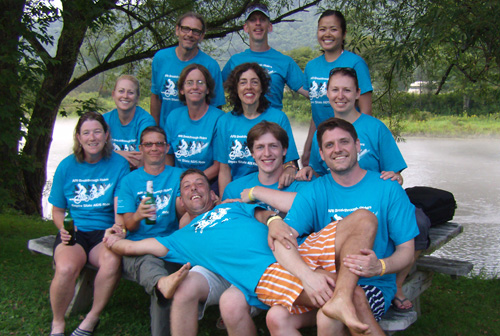UCSF-led Cycling Team Raises $80,000 to Fund AIDS Research

AIDS Research Institute Deputy Director Alan Beach pedals through Manhattan near the end of the 560-mile ride.
For seven days in August, a team of 13 UCSF staff and supporters bicycled 560 miles through sweltering heat, driving rain and a tornado to raise $80,000 to support AIDS research at UCSF.
From Aug. 16-22, the team, the Breakthrough Riders, pedaled from Niagara Falls to the lower tip of Manhattan to raise money for the AIDS Research Institute (ARI), one of the world’s premier AIDS research entities. The funds will be distributed through the ARI’s Breakthrough Fund, which provides seed money for promising research in its earliest stages.
The eclectic team was led by Alan Beach, interim deputy director of the ARI, and included three members of his staff; a woman whose partner works at UCSF and that woman’s neighbor; a woman who read about the event on UCSF’s LGBT website; and Beach’s husband and friend from Southern California. In addition, a mother and son and an engaged couple from New York also joined the Breakthrough Riders, simply because they strongly support what the ARI does, Beach said.
The weeklong event, the 7th annual Empire State AIDS Ride, was limited to 100 riders, each of whom was required to raise a minimum of $3,500.
Participants determined how their money would be directed by signing up for a team representing one of five beneficiary AIDS research and service organizations: the ARI; New York City’s AIDS Service Center; AIDS Community Services of Western New York; AIDS Rochester; and the Syracuse-based AIDS Community Resources. Of the five, the ARI is the only entity that focuses on research.
The ARI has been linked to the Empire State AIDS Ride since 2007. For the previous five years, two women from Seattle, Tracy Daugherty and Mary Harding, led their own ride from Seattle to San Francisco, raising money to benefit the ARI and to honor the memory of the brother each of them lost to AIDS.
Running their own event was a hugely demanding task, and so in 2007, Daugherty and Harding decided to attach themselves to a ride organized by someone else. They chose the Empire State ride because 82 percent of every dollar raised goes to the beneficiary; for most rides, that figure is 60 percent to 70 percent.
For the first time this year, Daugherty and Harding handed over full responsibility for the ride to the ARI staff.
This year’s event brought in $193,000 in donations for the five beneficiaries, more than half of which—nearly $98,000—was donated in support of the ARI. Beach, the event’s top individual fundraiser, has raised almost $28,000 himself to date.
Ultimately, the ARI will receive about $80,000, with the rest going toward the ride’s operational costs, Beach said.

Twelve members of the 13-member ARI team, the Breakthrough Riders, pose together on Day 4 of the weeklong fundraising ride.
On his fundraising page, Beach said he was riding in memory of friends he has lost to AIDS; in honor of friends who are currently living with or affected by the disease; and in support of the researchers at the ARI, whose work “has put us closer to a world without AIDS.”
In addition to a financial success, the ride was an incredible team-building experience for the ARI staff and a personal accomplishment that earned each cyclist plenty of bragging rights, Beach said.
“Even though there were individual teams, you become like a big family with all the other riders,” he said.
Less than two weeks after returning to San Francisco, Beach said he is already thinking ahead toward next year’s ride.

Team captain Alan Beach shows just how far the Breakthrough Riders have come by displaying their 560-mile route on his head.
The ARI coordinates and integrates all AIDS research activities at UCSF, bringing together 400 scientists and more than 60 programs from across the University and its affiliates. By stimulating innovation and supporting interdisciplinary collaboration, the ARI aims to promote the rapid translation of lab findings into widely available treatments—a key component of UCSF’s campuswide strategic plan.
UCSF has been on the front lines of the fight against AIDS since 1983, when University clinicians and researchers developed the country’s first outpatient AIDS clinic and inpatient ward at San Francisco General Hospital, an initiative now known as the Positive Health Program.
In addition, UCSF was one of the first institutions funded under the National Institutes of Health (NIH) Center for AIDS Research program, which supports 19 centers throughout the country. In 2007, the NIH awarded $15 million over a five-year period to the CFAR at UCSF and the affiliated Gladstone Institute of Virology and Immunology.
Top photo by Ginny Singer
Related Links:
AIDS Research Institute at UCSF
Positive Health Program at San Francisco General Hospital
NIH Doubles Support for HIV/AIDS Research Center
UCSF News Release, Nov. 1, 2007